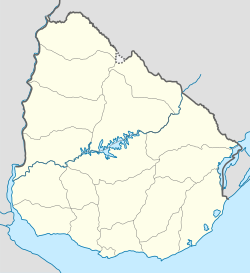Cerro Chato (locally [ˈsero ˈtʃato], Plain Hill) is a town in central Uruguay that is divided in three parts belonging to Durazno Department, Florida Department, and Treinta y Tres Department.
Cerro Chato | |
|---|---|
Town | |
 Parish Sagrado Corazón & Club Democrático. | |
| Coordinates: 33°6′0″S 55°8′0″W / 33.10000°S 55.13333°W | |
| Country | |
| Departments | Durazno Department Florida Department Treinta y Tres Department |
| Elevation | 244 m (801 ft) |
| Population (2011) | |
| • Total | 3,227 |
| Time zone | UTC -3 |
| Postal code | 30204 |
| Dial plan | +598 4466 (+4 digits) |
| 3 ISO codes: UY-DU, UY-FD, UY-TT | |
Geography
editThe town is located along Route 7, northeast by road from Valentines and southwest of Santa Clara de Olimar. It is located close to the source of the Yí River.
History
editThe town was founded based off extensive livestock farming in the area. In the 19th century, the area of Cerro Chato was a point of passage for postilions, stagecoaches and troops of cattle destined for other regions of Uruguay. In 1908, the national railroad reached the town, which turned it into a point from where cattle could be transported nationwide.[1]
On 8 January 1942, Cerro Chato was declared a "Pueblo" (village) by the Act of Ley Nº 10.112.[2] Its status was elevated to "Villa" (town) by the Act of Ley Nº 13.299 on 17 November 1964.[3]
Plebiscite of Cerro Chato of 1927
editIn 1927, a non-binding plebiscite took place in Cerro Chato to decide to which department it would belong: Durazno, Florida or Treinta y Tres. For this referendum, every citizen of the town was called to vote, including women. That was the first time in Latin America that women exercised the right to vote.[4] The Department of Durazno won the plebiscite, but this result was not accepted by the authorities. Therefore, Cerro Chato still is split between the three departments.
Population
editAccording to the 2011 census, Cerro Chato had a total population of 3,227; 1,694 lived in Trenta y Tres,[5] 1,124 lived in Durazno[6] and 409 lived in Florida.[7]
| Year | Population |
|---|---|
| 1963 | 2,513 |
| 1975 | 2,582 |
| 1985 | 2,459 |
| 1996 | 2,945 |
| 2004 | 3,278 |
| 2011 | 3,227 |
Economy
editThe main economic activity of the town is cattle and sheep production due to the quality fields in the area.[10]
The town was to give host to the controversial Aratirí iron mining project which would have produced 18 million tons of iron per year. However, the project was cancelled in 2016 after widespread ridicule over its impact to local farms.[11][12]
Places of worship
editReferences
edit- ^ "Derecho y justicia". Cuadernos del CLAEH. 37 (2). 2018-12-12. doi:10.29192/claeh.37.2.11. ISSN 0797-6062.
- ^ "Ley Nº 10.112". República Oriental del Uruguay, Poder Legislativo. 1942. Archived from the original on 4 March 2016. Retrieved 3 September 2012.
- ^ "Ley Nº 13.299". República Oriental del Uruguay, Poder Legislativo. 1964. Archived from the original on 6 October 2014. Retrieved 3 September 2012.
- ^ "El voto femenino cumple ochenta años en Uruguay". LaRed21. 2007. Retrieved 6 July 2011.
- ^ "Censos 2011 Cuadros Trenta y Tres". INE. 2012. Archived from the original on 10 October 2012. Retrieved 25 August 2012.
- ^ "Censos 2011 Cuadros Durazno". INE. 2012. Archived from the original on 10 October 2012. Retrieved 25 August 2012.
- ^ "Censos 2011 Florida (needs flash plugin)". INE. 2012. Retrieved 31 August 2012.
- ^ "1963–1996 Statistics / C". Instituto Nacional de Estadística de Uruguay. 2004. Archived from the original (DOC) on 15 June 2013. Retrieved 27 June 2011.
- ^ "Statistics of urban localities (1963–2004)" (PDF). INE. 2012. Archived from the original (PDF) on 13 November 2009. Retrieved 3 September 2012.
- ^ "Derecho y justicia". Cuadernos del CLAEH. 37 (2). 2018-12-12. doi:10.29192/claeh.37.2.11. ISSN 0797-6062.
- ^ "Aratirí a fojas cero - Diario EL PAIS - Montevideo - Uruguay". 2011-08-08. Archived from the original on 2011-08-08. Retrieved 2024-05-14.
- ^ "Ya nada será igual en Cerro Chato - Diario EL PAIS - Montevideo - Uruguay". 2011-08-08. Archived from the original on 2011-08-08. Retrieved 2024-05-14.
External links
edit
